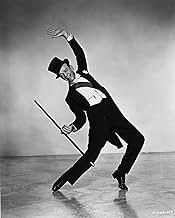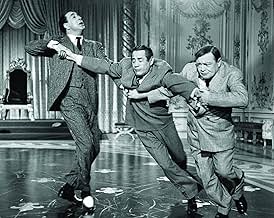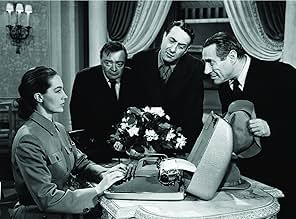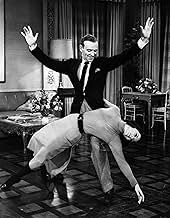IMDb RATING
6.8/10
4.5K
YOUR RATING
A Russian government official is sent to Paris to bring back her comrades; she soon gets a taste of Paris life and falls in love with an American movie producer.A Russian government official is sent to Paris to bring back her comrades; she soon gets a taste of Paris life and falls in love with an American movie producer.A Russian government official is sent to Paris to bring back her comrades; she soon gets a taste of Paris life and falls in love with an American movie producer.
- Awards
- 5 nominations total
Don Anderson
- Restaurant Patron
- (uncredited)
Edit Angold
- Wife
- (uncredited)
Frank Arnold
- Soviet Guard
- (uncredited)
Susan Avery
- Model
- (uncredited)
Virginia Bates
- Model
- (uncredited)
Herman Belmonte
- Reporter
- (uncredited)
Rodney Bieber
- Dancer
- (uncredited)
John Bleifer
- Tenant
- (uncredited)
Featured reviews
There are a number of good things about Silk Stockings, but there also is a professional finality about the movie that makes it easier to observe than to be delighted by it. It was one of the last of the big MGM musicals coming from Arthur Freed's production unit. It was the last musical Fred Astaire made as the lead. It was the last film directed by Rouben Mamoulian. It was based on the last Broadway musical Cole Porter wrote. Silk Stockings also was used to make a statement about the excesses some thought were ruining films and music...the advent of rock and roll and the technological changes in films with wide screen and stereo sound. It even takes a crack at the fashion for ballet in many musicals. You've got to be very clever and original to successfully parody things which are already self-parodies. Silk Stockings, even with its many entertaining moments, isn't that clever.
The story is based on Ninotchka, the female Soviet commissar who comes to Paris and finds romance reluctantly...and then enthusiastically. Paris is presented as a place where decadence was never more innocent and persuasive.
One of the things that seems so odd is that, for a Fred Astaire film, Astaire spends a good deal of time doing knee drops, full-length on-the-floor sprawls and athletic dance moves that limit the sophisticated and smooth Astaire style. He was 59 when he made the picture, and this might explain the relative shortness of some of the sequences. Still, while he is assured and immensely watchable (and while he can still do wonders with a cane), three major dance productions he is in just seem choppy.
Most of the songs from the Broadway show were retained and Porter wrote a couple of new ones. It's become routine with Porter to say that whatever his latest show was, the score was never one of his best. In this case, it's true. The romantic songs are great, but the topical specialty numbers just seem tired. Siberia and The Ritz Roll and Rock in particular miss the mark, in my opinion.
Astaire, as always, is first class. Charisse is easy to look at and a fine dancer. George Tobias, as a commissar in Moscow and Ninotchka's boss, gives a sly and dead-pan performance. Some of Porter's songs are very good. Mamoulian brought the film in on time and under budget. And Silk Stockings was a success with ticket buyers.
The story is based on Ninotchka, the female Soviet commissar who comes to Paris and finds romance reluctantly...and then enthusiastically. Paris is presented as a place where decadence was never more innocent and persuasive.
One of the things that seems so odd is that, for a Fred Astaire film, Astaire spends a good deal of time doing knee drops, full-length on-the-floor sprawls and athletic dance moves that limit the sophisticated and smooth Astaire style. He was 59 when he made the picture, and this might explain the relative shortness of some of the sequences. Still, while he is assured and immensely watchable (and while he can still do wonders with a cane), three major dance productions he is in just seem choppy.
Most of the songs from the Broadway show were retained and Porter wrote a couple of new ones. It's become routine with Porter to say that whatever his latest show was, the score was never one of his best. In this case, it's true. The romantic songs are great, but the topical specialty numbers just seem tired. Siberia and The Ritz Roll and Rock in particular miss the mark, in my opinion.
Astaire, as always, is first class. Charisse is easy to look at and a fine dancer. George Tobias, as a commissar in Moscow and Ninotchka's boss, gives a sly and dead-pan performance. Some of Porter's songs are very good. Mamoulian brought the film in on time and under budget. And Silk Stockings was a success with ticket buyers.
"Silk Stockings" is something of an enigma. Its release came at the moment much of America had switched over to viewing television and the musical film was dying. But it was still glorious. I couldn't care less about the 'outdated Red Russia' story line; this is a remake of a 1939 film and the USSR conflict was in the original as well. What're you gonna do? The main focus is on capitalist seduction- first by Tobias, Munshin, and Peter Lorre, then most beautifully by Astaire and Charisse. Note that in their first duet (the non-dancing "Paris Loves Lovers"), as they sing in perfect counterpoint, they appear to be undressing each other with their eyes. Later, in "All of You," the gloves come off and our two leads seduce each other through a most graceful dance in a living room. Astaire was 56 years old, Charisse was about 36, and there is still more electricity in their pairing than in some of the downright silly things passing as romantic comedies today. The undisputed highlight of the film is Ms. Charisse in a silent and sensuous expression of terpsichory as she puts on nude stockings, a camisole, and a flared transparent slip. OMG!!
A lot of humor at the expense of the Soviets (natch) is present throughout this musical version of "Ninotchka" in which Greta Garbo was the Russian who melts into a normal woman thanks to the spell of capitalism. Here it's CYD CHARISSE who plays the very uptight lady (with a stiffness that comes naturally to Cyd who could play an "ice princess" with the best of them). And FRED ASTAIRE is thankfully cast as an American film producer hoping to get her cooperation in borrowing a Soviet composer for his new film.
That's the nuts and bolts of the story, but the ingredients (including a trio of Soviet agents played by PETER LORRE, JULES MUNSHIN and Joseph BULOFF and a ditsy American singer/actress JANET PAIGE), are enough to stir up a lot of sardonic humor and some really good song and dance numbers. Paige is especially good with her "Stereophonic Sound" routine and "Satin and Silk", flirtatious and vivacious as ever in a top supporting role.
But it's the dance elements that count here--Astaire at his most elegant and Cyd Charisse gracefully matching him step by step all the way through. Her performance as the serious minded miss who gradually bends to his ways is one of her better contributions to film comedy.
Summing up: A delightful blend of Cole Porter songs and a clever script make this one a sheer pleasure, smooth as silk.
That's the nuts and bolts of the story, but the ingredients (including a trio of Soviet agents played by PETER LORRE, JULES MUNSHIN and Joseph BULOFF and a ditsy American singer/actress JANET PAIGE), are enough to stir up a lot of sardonic humor and some really good song and dance numbers. Paige is especially good with her "Stereophonic Sound" routine and "Satin and Silk", flirtatious and vivacious as ever in a top supporting role.
But it's the dance elements that count here--Astaire at his most elegant and Cyd Charisse gracefully matching him step by step all the way through. Her performance as the serious minded miss who gradually bends to his ways is one of her better contributions to film comedy.
Summing up: A delightful blend of Cole Porter songs and a clever script make this one a sheer pleasure, smooth as silk.
With the passing of Cyd Charisse last week at age 86, it's worth seeking out what is probably her finest work on celluloid. As an actress, she was bland. As a singer, she was dubbed (this time by the sonorous-sounding Carole Richards). But as a dancer, she was extraordinary. Along with Vera-Ellen, the ballet-trained Charisse was in the top echelon of the female dancers MGM showcased during the studio's golden years of which this film is one of its final stops. The clearest evidence of this claim can be found in the title tune when she dances with beauty and precision elegantly changing from her drab street clothes into silk and satin. It's a remarkable number, no small feat since her co-star is Fred Astaire. Directed by early musical maven Rouben Mamoulian in what turned out to be his last film, the movie also marks Astaire's swan song as a musical comedy leading man. Symbolically, he smashes his top hat at the end of his final solo number, "The Ritz Roll and Rock". The wear barely shows in his dancing where he pulls off some of his most acrobatic numbers, but other than the professionalism of the two leads, the inspiration seems sadly missing.
The film is a partial remake of Ernst Lubitsch's 1939 classic comedy, "Ninotchka" - in fact, some scenes are repeated verbatim - although certain elements have been altered to accommodate Cole Porter's musical score. This musical translation first showed up on Broadway two years earlier, but further revisions have obviously been made to tailor the story to the dancing talents of the leads. Charisse has the unenviable task of stepping into Greta Garbo's shoes as top Soviet envoy Ninotchka Yoschenko, who is sent to Paris to retrieve three lesser envoys swept up by the City of Lights. They had already botched their mission to lure famous Russian composer Peter Boroff back to the mother country. At the same time, American movie producer Steve Canfield wants Boroff to score his next picture, a musical bowdlerization of Tolstoy's "War and Peace" starring comically curvaceous Peggy Dayton, a parody of an Esther Williams-style swimming star whose been in the pool too long. As Dayton uses her feminine wiles to entice Boroff, Canfield tries to seduce Ninotchka, a far frostier proposition though the eventual thawing is inevitable. Porter's music has that effect or so we are led to believe.
Playing another variation on the worldly photographer he played in the same year's "Funny Face", Astaire is still at the top of his game, but his dance numbers are less elegant and appear markedly shorter than usual here. Charisse cannot compare to the legendary Garbo when it comes to line readings as a stoic communist. However, her dancing truly transcends not only the title tune but also "The Red Blues", an impressive ensemble number showcasing Charisse in a variety of dance styles, and the two duets with Astaire to "All of You" - the first a romantic defrosting of Ninotchka and the second a jauntier, rhythmic pas-de-deux. I wish the rest of the film was as good, but sadly, the energy wavers and the pacing flags during its 117-minute running time. The rest of the cast is serviceable, in particular, Janis Paige on familiar ground as Peggy (nicely paired with Astaire on the energetically cynical "Stereophonic Sound") and George Tobias as the deadpan Soviet commissar. Peter Lorre ("M") and Jules Munshin (Ozzie in "On the Town") show up as two of the bumbling envoys. The 2003 DVD has some interesting extras beginning with a ten-minute featurette featuring a 2003 interview with the still-elegant Charisse in "Cole Porter in Hollywood: Satin and Silk". Because of the Porter tie-in, there is also a 1934 Bob Hope short, "Paree, Paree", a silly musical comedy with Hope wooing singer Dorothy Stone. Also included is the original theatrical trailer, as well as "Poet and Peasant Overture" with Alfred Wallenstein conducting the MGM symphony orchestra playing the Franz Von Suppe piece as an overture to the movie.
The film is a partial remake of Ernst Lubitsch's 1939 classic comedy, "Ninotchka" - in fact, some scenes are repeated verbatim - although certain elements have been altered to accommodate Cole Porter's musical score. This musical translation first showed up on Broadway two years earlier, but further revisions have obviously been made to tailor the story to the dancing talents of the leads. Charisse has the unenviable task of stepping into Greta Garbo's shoes as top Soviet envoy Ninotchka Yoschenko, who is sent to Paris to retrieve three lesser envoys swept up by the City of Lights. They had already botched their mission to lure famous Russian composer Peter Boroff back to the mother country. At the same time, American movie producer Steve Canfield wants Boroff to score his next picture, a musical bowdlerization of Tolstoy's "War and Peace" starring comically curvaceous Peggy Dayton, a parody of an Esther Williams-style swimming star whose been in the pool too long. As Dayton uses her feminine wiles to entice Boroff, Canfield tries to seduce Ninotchka, a far frostier proposition though the eventual thawing is inevitable. Porter's music has that effect or so we are led to believe.
Playing another variation on the worldly photographer he played in the same year's "Funny Face", Astaire is still at the top of his game, but his dance numbers are less elegant and appear markedly shorter than usual here. Charisse cannot compare to the legendary Garbo when it comes to line readings as a stoic communist. However, her dancing truly transcends not only the title tune but also "The Red Blues", an impressive ensemble number showcasing Charisse in a variety of dance styles, and the two duets with Astaire to "All of You" - the first a romantic defrosting of Ninotchka and the second a jauntier, rhythmic pas-de-deux. I wish the rest of the film was as good, but sadly, the energy wavers and the pacing flags during its 117-minute running time. The rest of the cast is serviceable, in particular, Janis Paige on familiar ground as Peggy (nicely paired with Astaire on the energetically cynical "Stereophonic Sound") and George Tobias as the deadpan Soviet commissar. Peter Lorre ("M") and Jules Munshin (Ozzie in "On the Town") show up as two of the bumbling envoys. The 2003 DVD has some interesting extras beginning with a ten-minute featurette featuring a 2003 interview with the still-elegant Charisse in "Cole Porter in Hollywood: Satin and Silk". Because of the Porter tie-in, there is also a 1934 Bob Hope short, "Paree, Paree", a silly musical comedy with Hope wooing singer Dorothy Stone. Also included is the original theatrical trailer, as well as "Poet and Peasant Overture" with Alfred Wallenstein conducting the MGM symphony orchestra playing the Franz Von Suppe piece as an overture to the movie.
Like so many films produced in the mid- to late Fifties and early Sixties, when CinemaScope and other widescreen processes enhanced a production, directors and cinematographers were usually unafraid to take full advantage of the wider ratio. They weren't so concerned about how the final product would look on TV's square screens and probably didn't anticipate the visual desecration of "formatting" and "pan-and-scan" reductions. So it's nice to know that this musical, filmed when M-G-M was about to throw in the musical towel and bid an undeserved farewell to the Arthur Freed "unit," can now be enjoyed again close to its original theatrical aspect ratio on DVD.
Astaire and Charisse are a team to be treasured (so wonderful together in "The Band Wagon" a few years earlier, under Minnelli's astute guidance) and all of the others listed in this film's credits are professionals of the highest caliber. Astaire has a fun solo (with a chorus of top-hatted dancers) in the "Ritz Roll 'n' Rock" number; Cyd gets to put those legendary legs to dazzlingly opulent use in the "Red Blues" production show-stopper; and even Janis Paige gets to raunch it up in an amusing example of clever Cole Porter risking something risqué (for its day) in a song about the Empress Josephine, "commonly known as Jo"! And there's that first reel number, "Stere-oh-phonic Sound," that cleverly spoofs the contemporary moviemakers' attempts to lure people from their TV sets with widescreens, sound coming from every corner of the auditorium and eye-glazing color processes. It may not be prime Porter but it's all far-and-away more fun and enjoyable than anything we're likely to get today with the threatened revival of the movie musical with barbarians like Baz Luhrmann given the directorial reins.
Astaire and Charisse are a team to be treasured (so wonderful together in "The Band Wagon" a few years earlier, under Minnelli's astute guidance) and all of the others listed in this film's credits are professionals of the highest caliber. Astaire has a fun solo (with a chorus of top-hatted dancers) in the "Ritz Roll 'n' Rock" number; Cyd gets to put those legendary legs to dazzlingly opulent use in the "Red Blues" production show-stopper; and even Janis Paige gets to raunch it up in an amusing example of clever Cole Porter risking something risqué (for its day) in a song about the Empress Josephine, "commonly known as Jo"! And there's that first reel number, "Stere-oh-phonic Sound," that cleverly spoofs the contemporary moviemakers' attempts to lure people from their TV sets with widescreens, sound coming from every corner of the auditorium and eye-glazing color processes. It may not be prime Porter but it's all far-and-away more fun and enjoyable than anything we're likely to get today with the threatened revival of the movie musical with barbarians like Baz Luhrmann given the directorial reins.
Did you know
- TriviaAfter this film, Fred Astaire effectively retired from musicals, preferring to concentrate on non-musical roles, though he would produce several musical specials for TV in the next few years. He wouldn't make another musical until La Vallée du bonheur (1968).
- GoofsIt becomes fairly obvious during the "Fated to be Mated" duet between Fred Astaire and Cyd Charisse that Charisse is wearing a skirt one moment and culottes (or flared shorts) the next. The bottom half of her costume changes on each cut of the dance when they are doing deep knee bends, and this is where the culottes show. For the upright spins and lifts, the skirt shows. The dance was obviously performed twice and edited into one sequence.
- Quotes
Vassili Markovitch, Commisar of Art: I want to look somebody up. Does this office have a copy of Who's Still Who?
- ConnectionsEdited into Histoire(s) du cinéma: Une histoire seule (1989)
- SoundtracksI've Got You Under My Skin
(1936) (uncredited)
Music by Cole Porter
Heard at the beginning as Steve and Boroff arrive at the hotel
- How long is Silk Stockings?Powered by Alexa
Details
- Release date
- Country of origin
- Language
- Also known as
- Silk Stockings
- Filming locations
- Production companies
- See more company credits at IMDbPro
Box office
- Budget
- $1,853,463 (estimated)
- Gross worldwide
- $9,755
- Runtime1 hour 57 minutes
- Sound mix
- Aspect ratio
- 2.35 : 1
Contribute to this page
Suggest an edit or add missing content


































